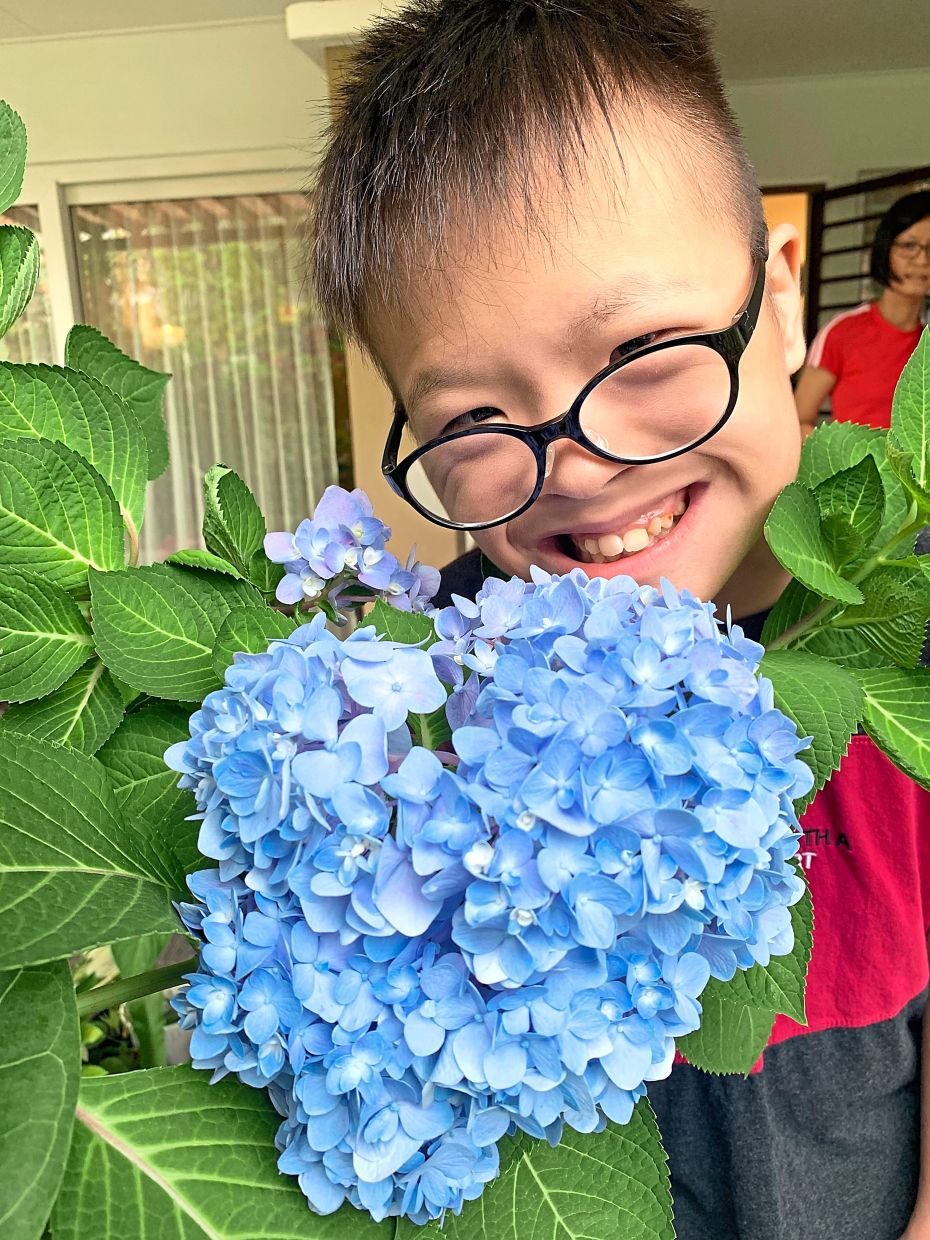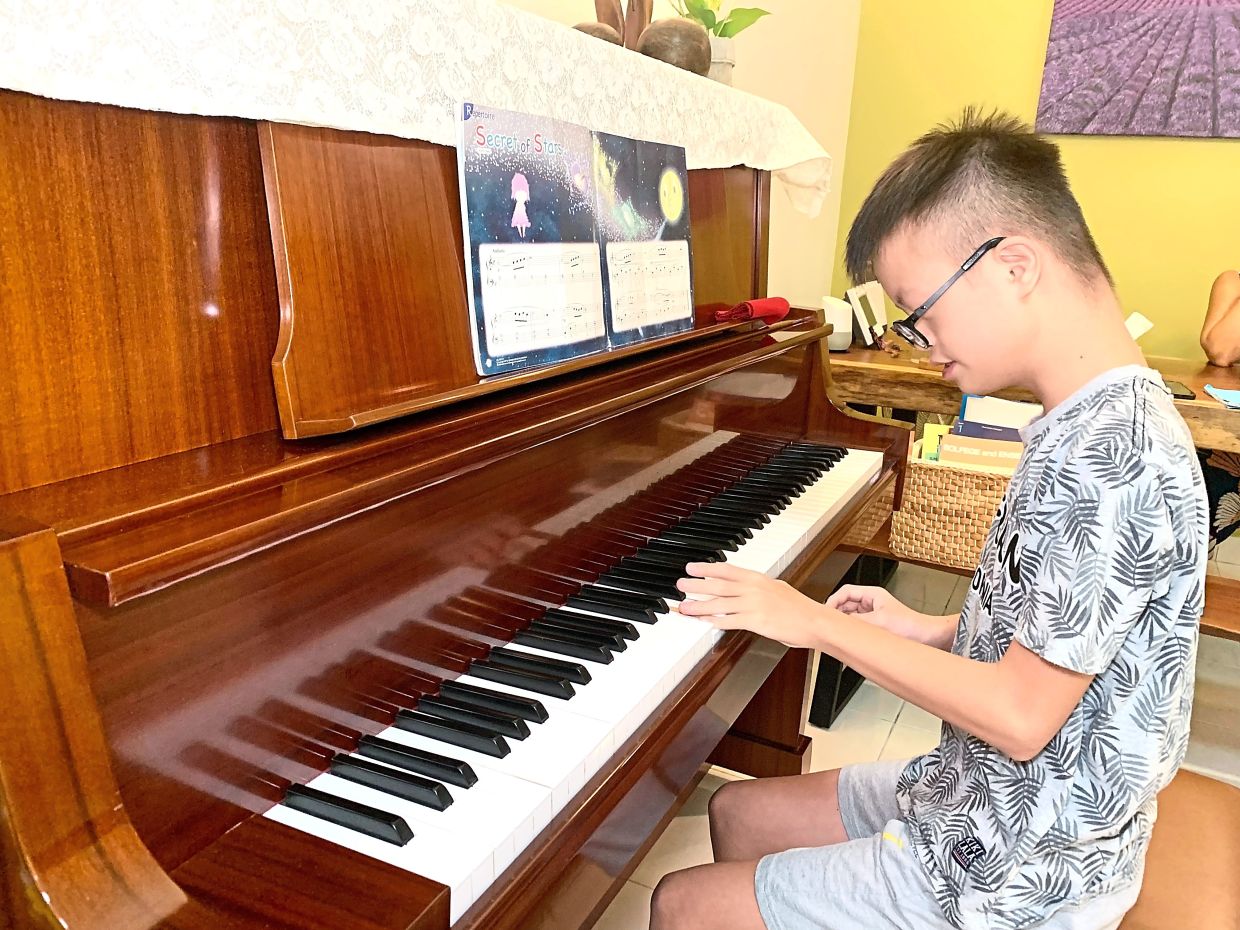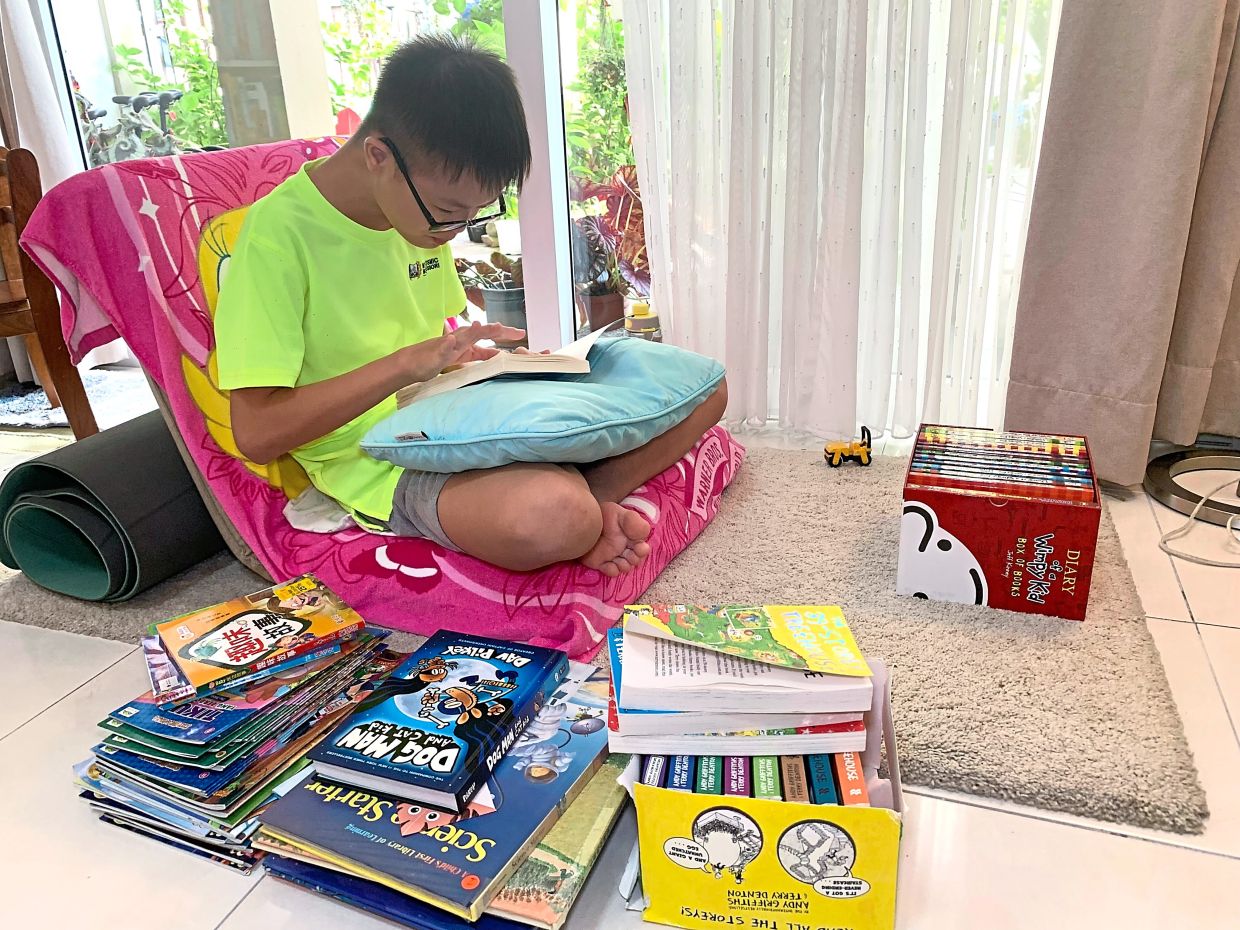Yan is only 11, and he loves to tinker around the garden with Lim. Photos: The Star/S.S.Kanesan
Almost as soon as Yan Wei Xing gets home from school, he makes it a point to check on all his outdoor plants and vegetables. Wei Xing is only 11 but he loves pottering about the garden, tending to the many plants he has grown, such as begonias, caladiums, Swiss cheese plants and hydrangeas. He’s also planted vegetables like bitter melon, cabbage and asparagus as well as herbs such as basil, mint and parsley – all of which are thriving under his care.
Wei Xing, who has Down syndrome (DS), is proud of the fruits of his labour. He has grown about 50 plant species in the garden of his home in Bandar Puteri Puchong in Selangor.
He also sells his potted plants and his mum Florence Lim saves the money from his sales for her son’s education fund and his savings. Lim helps promotes her son’s plants on several Facebook groups, including Malaysian Gardeners, Klang Valley Plant Acquisition and Malaysia Plant Sales.
“My husband and I are gardening enthusiasts. During the pandemic, we introduced Wei Xing to gardening as we had to stay home during the movement control order periods. He seems to enjoy gardening and he found it relaxing. He loves watching plants grow,” says Lim, 48.
“We also started to propagate our hydrangeas and calladiums and sell our plants. On average, we sell about 10 plants each month. Wei Xing can communicate with people and he is slowly building his confidence. He speaks slowly. People need to be patient and give him time to speak. His confidence has grown by leaps and bounds,” says Lim.
People with DS are born with a genetic disorder which affects their intellectual ability.
However, many children with DS can learn various skills and, though it may take longer than typical children, they can learn to read, bake, sew and do a variety of other tasks that typical children can.
The goal of many parents with DS children is to teach their special needs children to live independently and lead a fulfilling life.
Lim is no exception. She wants to equip her son with various skills so that he can function independently, especially once she and her husband, information technology consultant Yan Kim Fui, 50, are no longer around.
“Parents play an important role in empowering their child with special needs and making sure they succeed in life.
“The first step is for parents to accept and embrace their child’s disability. Work towards harnessing their child’s talents. Slowly, society will be inclusive and more accepting of people with special needs.”
Coping with challenges
Lim admits that when she and her husband first found out that their son had special needs they didn’t quite know how to react.
“We knew very little about DS when Wei Xing was born. I was 37 then, and accepting the news about his condition wasn’t easy.
“Besides being born with DS, Wei Xing also suffered from Hirschsprung’s disease. As a result, he couldn’t pass motion and had to undergo several operations as an infant. Those were very challenging days for us. Our concern at the time was nursing him back to health,” Lim shares.
Lim’s mother cared for Wei Xing for nine months while she worked as an operations administrator. When he turned 10 months, Lim quit her job to focus on raising her boy.
“When you have a child with special needs, career becomes secondary. My main concern was his health. Thankfully my husband earns a decent salary that allows us to live comfortably. And I’m blessed that my husband has been very supportive throughout this entire journey,” she adds.
Once Wei Xing’s health stabilised, Lim started to focus on equipping him with the skills he would need to function in society. She uses the Doman Method, a teaching technique for children with neuro-developmental conditions like autism, cerebral palsy, DS and speech apraxia.
This treatment method, founded by educator Glenn Doman, incorporates physiological, nutritional, physical, sensory, and cognitive treatments carried out by parents at home.
“The programme focuses on integrative treatment methods. It emphasises the need to keep learning fun to create a good learning environment for the children. It is important to respect and trust your child.
“The method also encourages play as it is said that this can help children retain information better,” Lim explains.
Lim follows the same approach even now, whenever her son learns a new skill. So far, the results have been promising.
Currently, Wei Xing is enrolled at a Montessori-based school in Puchong where he learns reading, writing and arts and craft.
Today, Wei Xing has completed his Grade Two piano exam, and he can play piano pieces like The Entertainer (Scott Joplin), Allegro (Thomas Attwood) and Angelfish (Anne Crosby Gaudet).
“He started attending music lessons when he was two years old. The secret is to take things slowly with children with special needs. You can’t rush them. Parents must follow their pace,” says Lim.
At home, Lim works on Wei Xing’s skills by coaching him in reading, painting and performing other tasks as well. He also attends swimming lessons.
“He is a big fan of Jeff Kinney’s Diary of a Wimpy Kid, Enid Blyton’s Famous Five, and A Faraway Free Adventure series. He also enjoys The Treehouse series by authors Andy Griffith and Terry Denton.
“Most children might take a couple of years to learn a new skill. But due to his condition, Wei Xing needs extra time to pick up a new skill.
“It took him five years to master different swimming strokes like freestyle, butterfly and backstroke,” she says proudly.
Lim admits that teaching Wei Xing new skills isn’t easy – because his progress is slower than that of a typical child, it takes a lot of patience and perseverance.
“Wei Xing goes through the same cycle every time he learns a new skill. It starts off with tears. But once he has acquired the skill, it becomes his passion.
“He took five years to learn to ride a two-wheel bicycle. But he can now cycle independently and, as he is familiar with the neighbourhood, he cycles alone.
“Our neighbours and security guards know him and they too keep an eye on him,” Lim shares.
Wei Xing is lucky his parents are setting a strong foundation for his future.
“By providing him with many skills, he will have more choices to choose for his future.
“He could be a painter, pianist or gardener one day. By exposing him to gardening, he can eventually work in a plant nursery or make a living from selling plants. Slowly, we are sowing the seeds for his future,” Lim concludes.











